Women’s History Month celebrates the contributions and achievements women have made to the history, culture, and society of the United States.
Hydrocarbons and Geothermal Energy Office
March 29, 2023Women’s History Month celebrates the contributions and achievements women have made to the history, culture, and society of the United States. To take part in the celebrations this month, the U.S. Department of Energy’s Office of Fossil Energy and Carbon Management (FECM) met with several of our all-star employees to find out what Women’s History Month means to them.
We hope you enjoy learning more about a few of the amazing women that contribute to the success of FECM. If you would like more information about our #EmployeeAppreciation and #FECMAllStars, explore our Twitter, Facebook, and LinkedIn pages!
Vanessa Nunez-Lopez, Director of Advanced Remediation Technologies – Office of Research and Development
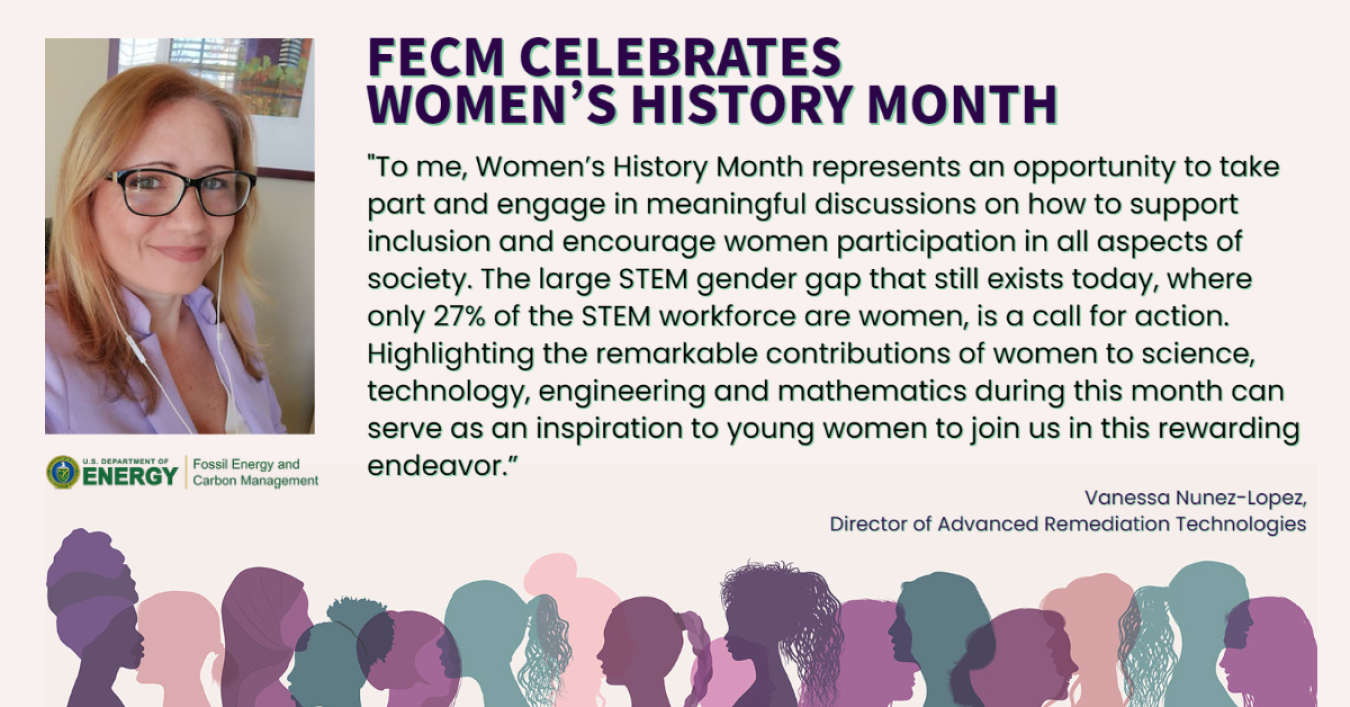
What work do you do for FECM?
I lead the Advanced Remediation Technologies (ART) Division in the Office of Resource Sustainability. In ART, we administer FECM’s research and development program for the development of technologies and solutions that can be applied to the remediation and prevention of environmental impacts from the recovery of fossil energy resources.
An important part of our program is to develop the capacity to fully treat produced water (the water that inevitably comes out of oil and gas wells) so it can be beneficially reused in areas where fresh water is scarce, while exploring the potential to recover critical minerals and other beneficial resources associated with these waste streams.
What does Women’s History Month mean to you?
To me, Women’s History Month represents an opportunity to take part and engage in meaningful discussions on how to support inclusion and encourage women participation in all aspects of society. Given my background and my experience in a field where women are vastly underrepresented, I know we need to pursue serious efforts to reduce the large science, technology, engineering, and mathematics (STEM) gender gap that still exists, where only 27% of the STEM workforce are women. Highlighting the remarkable contributions of women to STEM during this month can serve as an inspiration to young women to join us in this rewarding endeavor.
Ayaka Jones, General Engineer – Office of Carbon Management
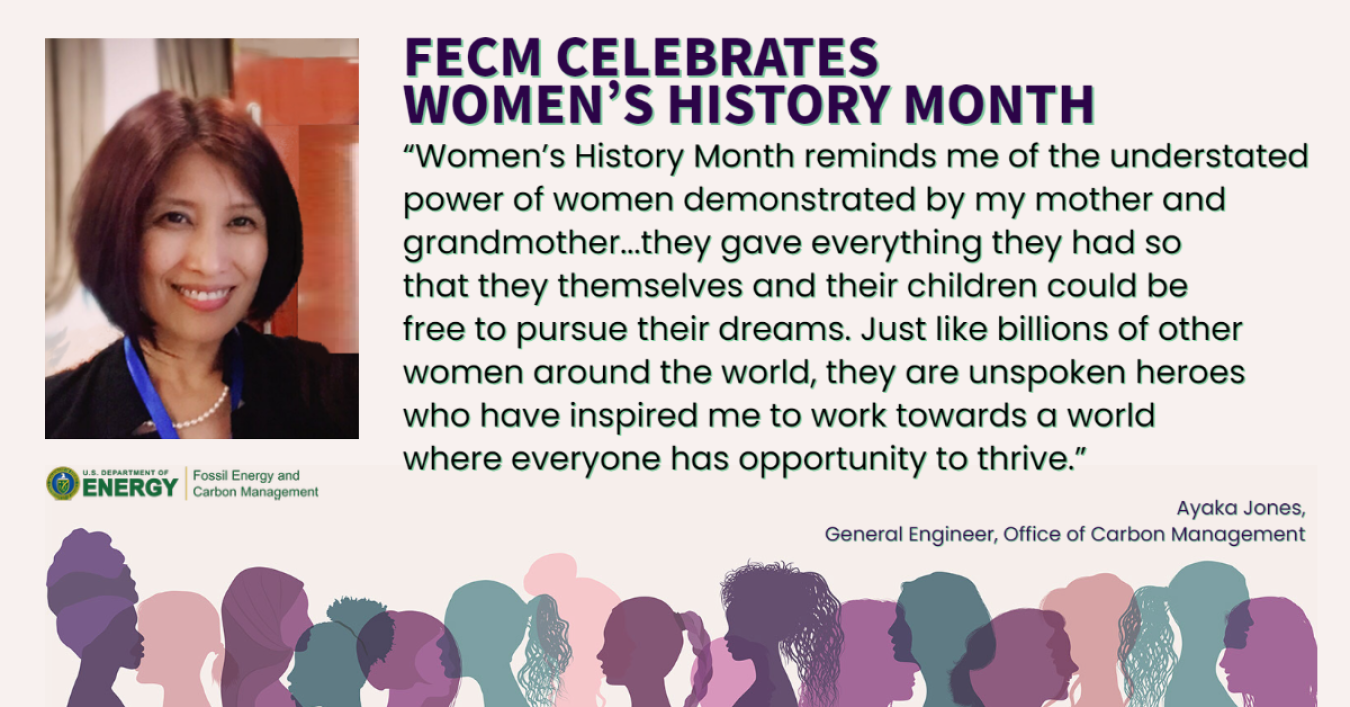
What work do you do for FECM?
I recently began a detail in FECM’s Point Source Carbon Capture Division. In this position, I will be supporting the division’s project reviews, external engagements, and budget process, along with the evaluation of funding applications. In my regular role as an international technical advisor, I help identify domestic and international partnership opportunities and facilitate FECM’s bilateral and multilateral engagements with the energy ministries of Asia-Pacific countries to advance carbon management technologies.
What does Women’s History Month mean to you?
Women's History Month reminds me of the understated power of women demonstrated by my mother and grandmother. Up against unthinkable difficulties, they gave everything they had so that they and their children could be free to pursue their dreams no matter how unconforming the dreams were at the time. Just like billions of other women around the world, they are unspoken heroes who have inspired me to work towards a world where everyone has opportunity to thrive.
Gabby Intihar, Senior Program Manager – Office of Resource Sustainability
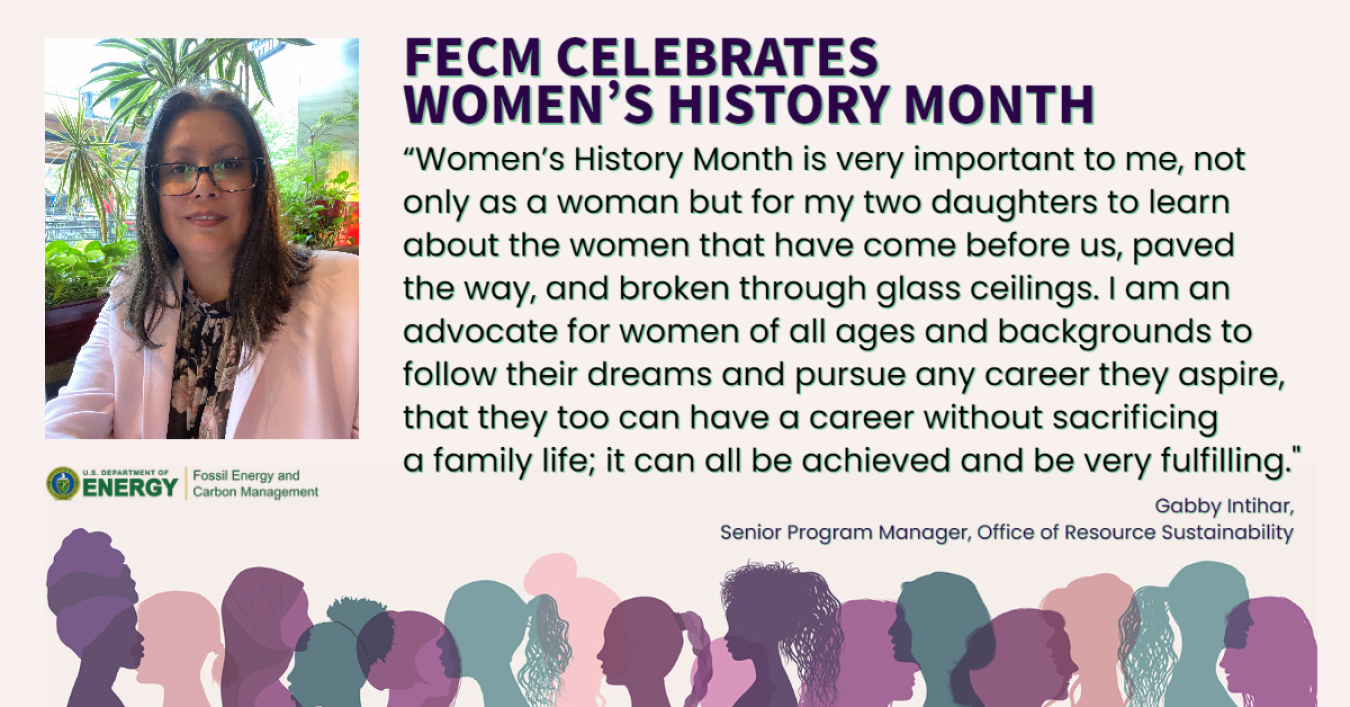
What work do you do for FECM?
I provide overall leadership and direction to pioneering engineering development efforts in achieving new and innovative capabilities for Critical Materials Innovation, Efficiency, and Alternatives (CMIEA) research, with national and international scope and impact. I work with technical experts across the Department of Energy to set strategic and technical direction for the CMIEA.
My duties include overseeing the development and implementation of research and development activities leading to the implementation of resilient, sustainable, responsible, and domestic supply chains for critical materials, supporting programmatic and technical goals.
Additionally, I provide authoritative consultation, advice, technical input, analyses, and recommendations to the highest levels of management within and outside of the Department on engineering matters of exceptional importance.
What does Women’s History Month mean to you?
Women’s History Month is very important to me, not only as a woman but for my two daughters to learn about the women that have come before us, paved the way, and broken through glass ceilings. During Women’s History Month it is inspirational to see the numerous contributions women through history have accomplished, broken barriers, and have shown that the possibilities are endless.
The women before me have made it possible for someone like me to be able to fulfill my dreams and still aspire to do more. I am an advocate for women of all ages and backgrounds to follow their dreams and pursue any career they aspire, that they too can have a career without sacrificing a family life; it can all be achieved and be very fulfilling.
Carol Loman, Executive Assistant – Front Office
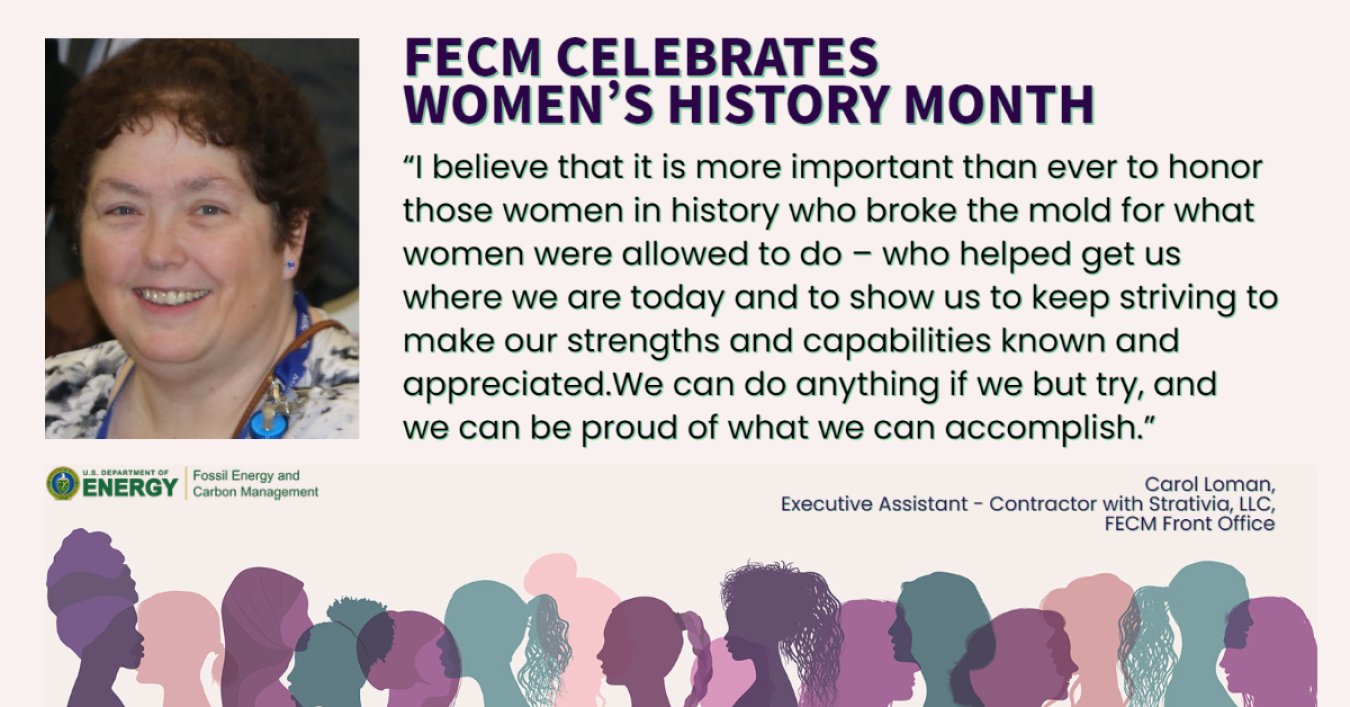
What work do you do for FECM?
I am an administrative executive assistant supporting FECM’s Principal Deputy Assistant Secretary, Dr. Jennifer Wilcox. I also provide support to leadership across the team, including Assistant Secretary Brad Crabtree, Chief of Staff Priyanka Hooghan, among others.
As a part of my day-to-day responsibilities, I answer phone calls, respond to in person inquiries, and arrange schedules and travel itineraries, in addition to a variety of other tasks.
What does Women’s History Month mean to you?
I believe that it is more important than ever to honor those women in history who broke the mold for what women were allowed to do—who helped get us where we are today and to show us to keep striving to make our strengths and capabilities known and appreciated. We can do anything if we but try, and we can be proud of what we can accomplish.
Amy Sweeny, Director – Office of Regulation, Analysis, and Engagement
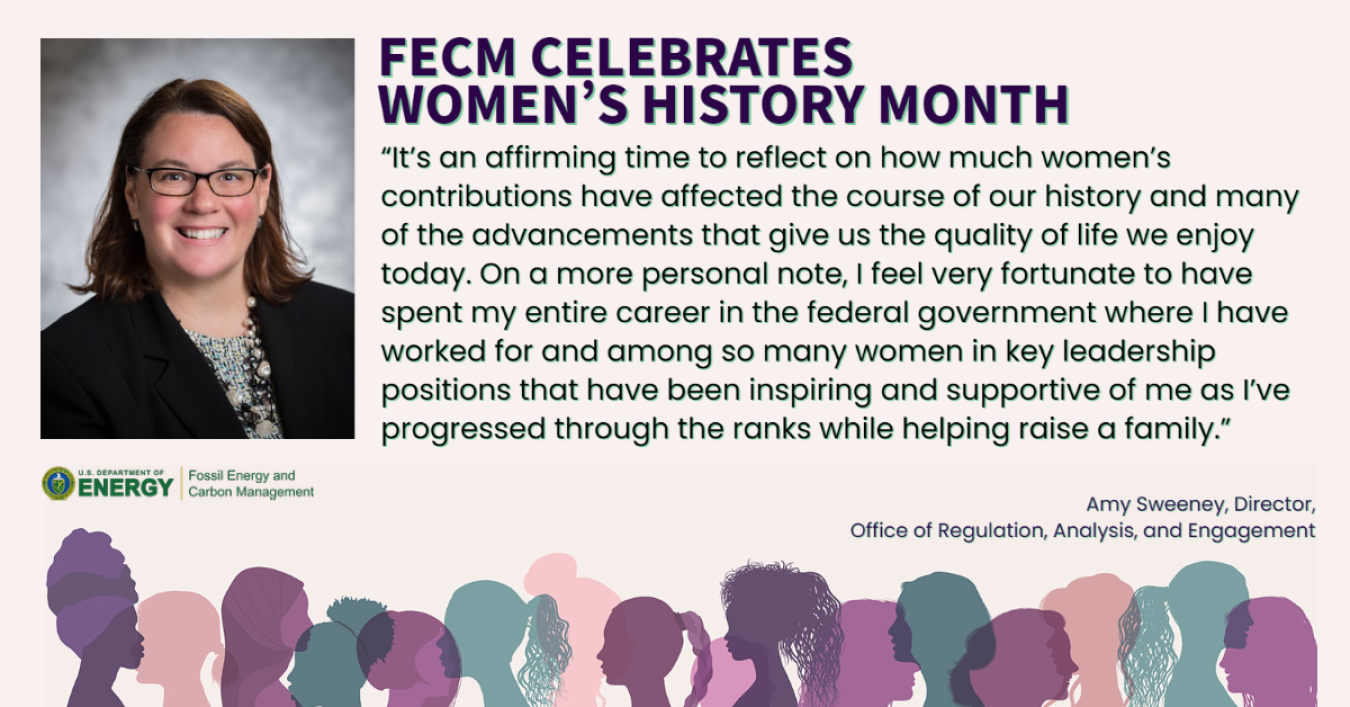
What work do you do for FECM?
I lead FECM’s Office of Resource Sustainability’s Office of Regulation, Analysis, and Engagement where, as the title suggests, we regulate, analyze, and engage! Our work is focused primarily on natural gas where we lead the review of applications to import and export natural gas (including liquefied natural gas) under the Natural Gas Act. We also perform analysis that supports regulatory decisions and other relevant topics that pertain to the Office of Resource Sustainability’s mission, and we engage with stakeholders about our work—including a lot of international engagement.
It’s an exciting and challenging portfolio to work with, and like any great job, working among so many smart, dedicated (and fun!) colleagues is the best part.
What does Women’s History Month mean to you?
Women’s History Month is always an affirming time to reflect on how much women’s contributions have affected the course of our history and many of the advancements that give us the quality of life we enjoy today, as we strive toward a more just and sustainable future. But on a more down-to-earth note, I feel very fortunate to have spent my entire career in the federal government where I have worked for and among so many women in key leadership positions that have been both inspiring and supportive of me as I have progressed through the ranks while helping to raise a family.
Dr. Mani Gavvalapalli, Program Manager – Office of Carbon Management
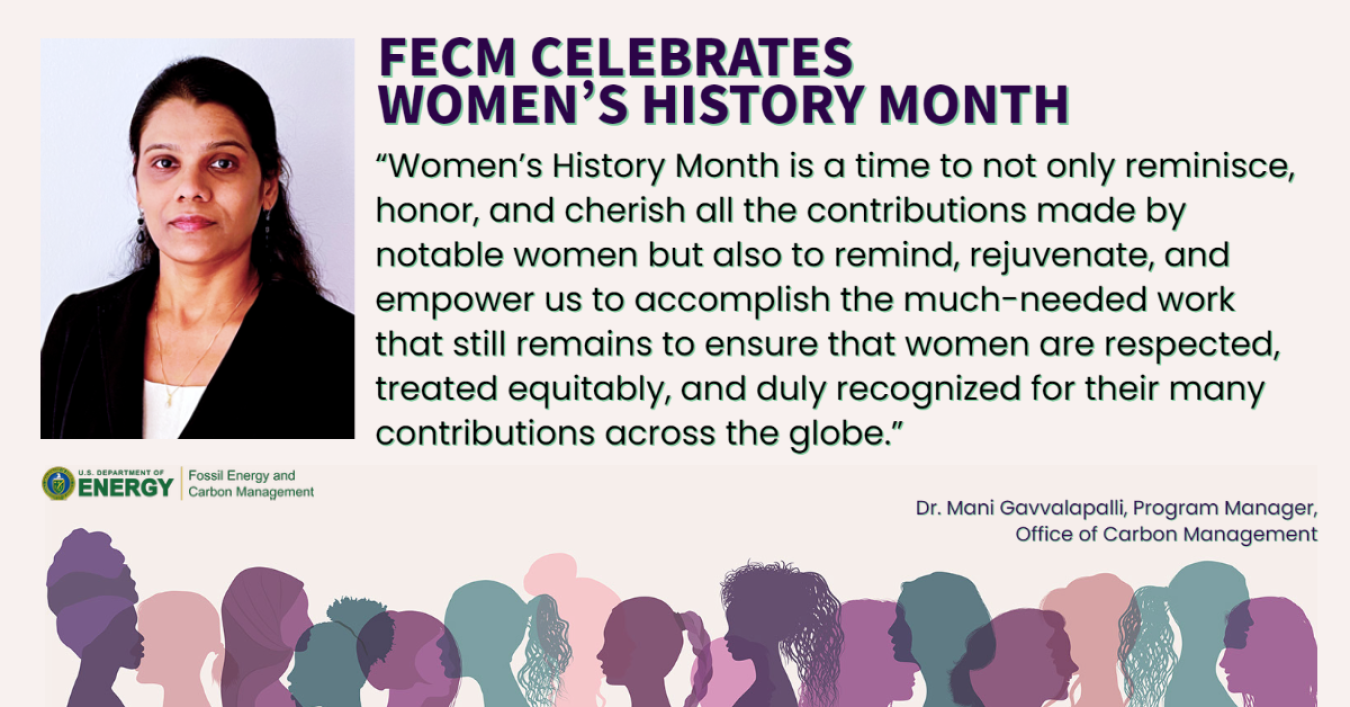
What work do you do for FECM?
I am the Program Manager for Point Source Carbon Capture in FECM’s Office of Carbon Management. In this role, I oversee planning, budget, management, and administration of research, development, and demonstration activities that are focused on advancing technologies to reduce carbon dioxide emissions in the power and industrial sectors by improving their performance, reducing cost, and scaling-up for widespread deployment.
I also support intra-agency coordination and stakeholder engagement to further advance carbon management approaches to achieve a net-zero carbon economy. I have previously served as FECM’s acting Chief of Staff and supported Assistant Secretary Brad Crabtree and Principal Deputy Assistant Secretary Dr. Jennifer Wilcox.
What does Women’s History Month mean to you?
Women’s History Month is a time to not only reminisce, honor, and cherish all the contributions made by notable women but also to remind, rejuvenate, and empower us to accomplish the much-needed work that remains to ensure that women are respected, treated equitably, and duly recognized for their many contributions across the globe.

